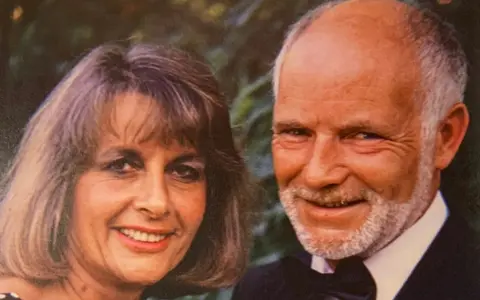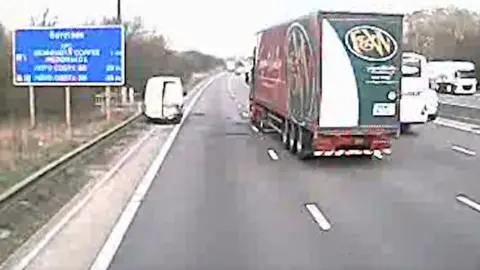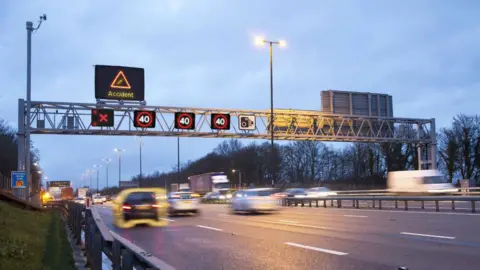Driver crushed by his own van after stopping on smart motorway
 Family photo
Family photoA man was crushed by his own van and later died when he pulled over on a smart motorway and the van was hit by a car, an inquest has heard.
Derek Jacobs, 83, had stopped his VW van on the M1 in Derbyshire after a blowout affecting one of his tyres.
A 77-year-old woman driving a Ford Ka then failed to see the van in time and hit it, causing the van to crush Mr Jacobs against the safety barrier.
The woman's 78-year-old husband was also injured and died in hospital.
Mr Jacobs' widow, Sally Jacobs, has called for hard shoulders to be reinstated on all smart motorways.
 Derbyshire Police
Derbyshire PoliceAssistant Coroner Susan Evans told Chesterfield Coroner's Court Mr Jacobs would not have died if there had been a hard shoulder for him to stop in.
However, she pointed out the driver of the Ford Ka, Jean Scripps, had time to stop before hitting the van, or alternatively she could have moved to the right as multiple other drivers had done.
This was because Mr Jacobs' van was only encroaching in the lane by 65cm, as he had moved his car over to the left as far as possible.
"It's clear to me from the evidence that this collision occurred simply because Mrs Scripps did not see the obstruction," said Miss Evans.
"I say this because of her complete lack of any reaction at all to the obstruction prior to the actual collision, despite having sufficient time and distance and options to avoid a collision.
"For reasons we will never know, she appears to have not been paying attention to the road, and this is the reason the collision occurred."
 Gov.uk
Gov.ukThe collision happened on 22 March 2019, north of junction 30 of the M1, near the border of Derbyshire and Yorkshire.
Mr Jacobs had been driving north, as had Mrs Scripps, whose husband Charles Scripps was a passenger in the Ford Ka.
The blowout completely removed one of Mr Jacobs' tyres, so he pulled over to the left of lane one and got out.
'Time to stop'
Sgt Paul Moorcroft, who investigated the collision for Derbyshire Police, said other vehicles had either changed lanes to avoid Mr Jacobs' van, or moved to the right so they were straddling lanes one and two.
He said Mrs Scripps' car was narrow enough to have continued driving in lane one without even hitting Mr Jacobs' van.
However, video footage showed she had been driving "very, very close" to the "rumble strip" on the left side of the motorway, he said.
"Had the driver of the Ford Ka seen the van and had the Ford Ka been driven in a more central lane position, the driver would have been afforded the opportunity to - with a very slight steering input - drive past the VW without a collision occurring," said Sgt Moorcroft.
Mrs Scripps had been driving between 53mph and 54mph, and Sgt Moorcroft did various calculations which showed she should have had time to stop before hitting the van.
"Even with a slow reaction time she would have been able to stop," said Sgt Moorcroft.
"We have ascertained she would have had a view of the stricken VW van some 5.2 seconds prior to impact.
"Even with a three-second reaction time she would have been able to stop."
The footage showed Mrs Scripps did not slow down at all, did not change her road position at all, and did not indicate in an attempt to move right.
After hitting the van, the Ford Ka rotated and flipped over, and was hit by a coach.
Mrs Scripps and her husband were helped out of the the car by members of the public who had stopped to help.
Statements from some of them were read as evidence at the inquest. Some of the witnesses said Mrs Scripps described the van braking suddenly in front of her - despite the van having been stationary.
Mr Jacobs, from Edgware in Middlesex, was still conscious when members of the public went over to try to help him, but died at the scene from chest injuries.
Mr Scripps, who was from Northampton, died at Northampton General Hospital on 9 May from pneumonia, and neck, chest and abdominal injuries.
Delay changing signs
The inquest heard there had been a delay in changing speed limit signs on the smart motorway to 50mph, and warning drivers that an obstruction had been reported.
There is a target time for this to happen within three minutes, but it actually took eight minutes due to "human error".
However, the coroner said it would have made no difference if the signs had been changed within the target time, as the collision had already happened by then.
"I have considered whether this delay may have contributed to the deaths of Mr Jacobs and Mr Scripps but there is no evidence that it did so," she said.
National Highways chief executive Nick Harris said: "Our deepest sympathies remain with the families of Mr Jacobs and Mr Scripps, and all those affected by this tragic incident.
"It is vitally important to learn lessons from every road traffic collision and we will continue to build on the work and safety improvements already under way, taking all the necessary steps to help drivers and passengers feel and be safe."
'Wonderful husband'
Mr Jacobs' widow had boycotted the inquest, telling The Telegraph she felt it was going to be a "whitewash".
"I want the hard shoulder reinstated immediately," she said.
"You wouldn't take lifeboats off boats and say 'we don't use them very often'."
The couple had been together since Sally was only 16, and Derek was only 17, after they met at a party to celebrate the coronation of Queen Elizabeth II in 1952.
They then married when Sally was 21, and went on to have two sons and two grandchildren.
"He was the most wonderful husband," said Mrs Jacobs.
"I tell everybody 'tell your partner every day you love them, because life is so short'."
In her findings, the coroner acknowledged smart motorways were "hugely controversial" because of the lack of any hard shoulder.
"It is immediately apparent that, had there been a hard shoulder, this incident would not have occurred because Mr Jacobs would have been able to pull off the live lane entirely," the coroner said.
"That said, there are many roads in the road network, including dual carriageway A roads that are subject to the national speed limit and do not have the benefit of any hard shoulder."

Follow BBC East Midlands on Facebook, on Twitter, or on Instagram. Send your story ideas to [email protected].
